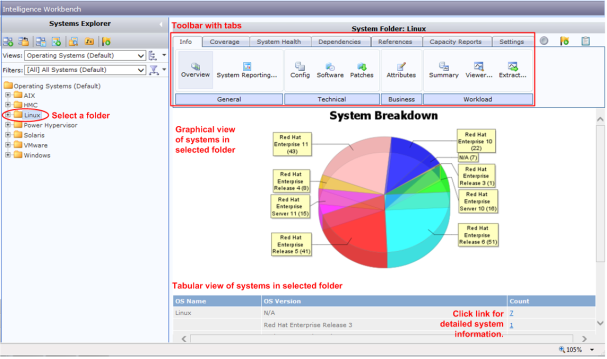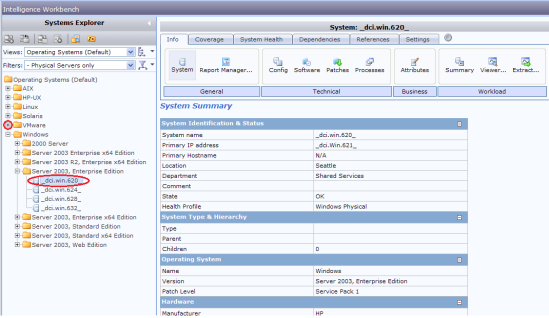DCE Dashboards
DCE Dashboards
#171080
Dashboards provide you with a quick and intuitive way to view folder level and system level information. Initial dashboard views display an overview of the selected folder/system. Using the toolbar, you can look at other aspects of the selected folder/system, such as the installed software or the attributes associated with it, etc.
You can also drill-down to a greater level of detail for the selected folder/system, by clicking hyperlink items, such as system counts.
There are two dashboard viewers associated with Data Center Explorer.
- System Folder Level—This viewer provides both a graphical and tabular summary of the systems contained in the selected folder.
- System Level—This viewer provides a tabular summary of the selected system.
System Folder Level Dashboard Viewer
The system folder level dashboard view displays information about all systems contained within the selected folder.
- In the Analysis Console, navigate to the Analysis Workbench tray > Data Center Explorer.
- Select a folder in the System Explorer tree view. The system folder dashboard viewer is displayed.
The viewer includes a toolbar for navigating the dashboard, a summary-level pie chart of the systems within the selected folder, and a table from which you can drill-down to access more detailed system information.
System Level Dashboard Viewer
The system level dashboard displays information about a selected system. The tabs are similar to those described for the system folder and contain the same toolbar options.
At this level, you are focusing on specific a system as opposed to groupings of systems.
The initial dashboard view at the system level displays a summary of configuration information for the selected system. Click the expand button  associated with a category type (e.g. VMware) to view its information, if that category is collapsed.
associated with a category type (e.g. VMware) to view its information, if that category is collapsed.
Once the folder or system is selected, the following tabs are displayed in the dashboard pane.
- Info
- Coverage
- System Health
- Dependencies
- References
- Settings

